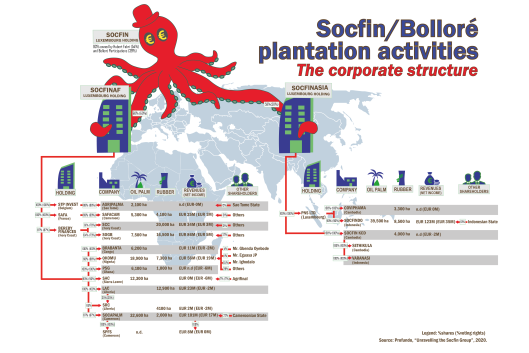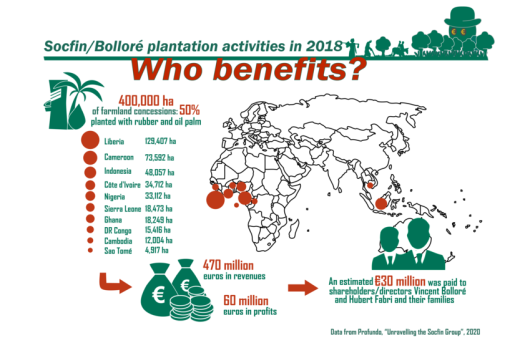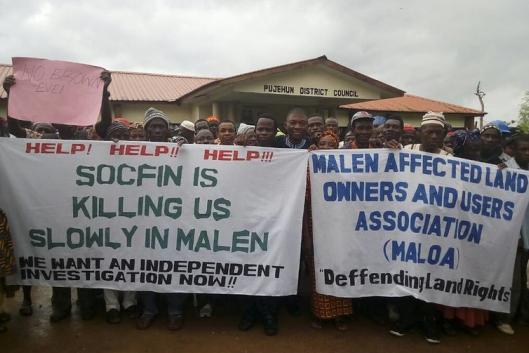Civil society organizations have welcomed the finalization of a report of a Technical Committee set up by the government of Sierra Leone to look into a legal dispute between the multinational company Socfin and communities affected by the company’s oil palm plantations in the Malen Chiefdom in Sierra Leone. The completion of the report concludes the investigative phase of the conflict resolution process concerning the land conflict between Socfin and communities in the Malen Chiefdom and is an important step towards finding a resolution to the long-standing land dispute.
Although tensions within Socfin’s plantations have increased in recent months and the criminalization of community representatives and civil society organisation partners has intensified, local organisations consider the report as a sufficiently solid basis upon which to continue the dialogue (mediation) process, as proposed by the Vice-President of Sierra Leone in 2019.
In a 31 March 2020 letter to the Vice-President, organizations from Sierra Leone that support communities affected by this conflict ask the government “to take proactive steps in building the confidence and trust of your electorate by investing more time in resolving the conflict and prevent a future intractable conflict that will lead to insecurity and instability in the chiefdom and the district.” The letter is available here.
At the same time, an international coalition of civil society organizations that has been following this case for many years, urged the President of Sierra Leone to take step to resolving the conflict. Their letter is available here.
Core elements of the Investigation Report
The main findings of the Report of the Technical Committee highlight several of the allegations that affected communities have voiced since 2011. They confirm, among others, that:
– the land lease agreements are unlawful
– that payments of lease rent and other land charges were either inadequate or paid to the wrong people
– the parcels of land were not properly surveyed and demarcated
– buffer zones between communities and Socfin plantations have not been respected and that this has negatively impinged upon the communities’ capacity to live in dignity
– the Paramount Chief’s conduct was inappropriate and potentially illegal
– SOCFIN’s development projects in the communities were inadequate
– there are serious pollution concerns linked to the company’s activities
A detailed analysis of the Investigation Report made by FIAN Belgium is available here.
The purpose of this FIAN Belgium analysis of the Technical Committee’s report is to contribute to the land conflict resolution process and the setting up of a mediation mechanism, in accordance with international human rights law and standards. It is limited exclusively to the Investigative
Report, and as such does not seek to undertake a human rights analysis of the land conflict in its entirety. Such an analysis can be found in the comprehensive report published in 2019 under the title: Case report: Land Grabbing for Palm Oil in Sierra Leone: Analysis of the SOCFIN Case from a Human Rights Perspective. FIAN Belgium 2019. (In French).
About SOCFIN
In February 2020, the independent Dutch research group Profundo published a guide to the corporate structure behind Socfin’s oil palm and rubber plantation activities in Africa and Asia.

Socfin is a holding company based in Luxembourg. Its main shareholders are Hubert Fabri (Belgium) and Vincent Bolloré (France) and their families, who are bound together in numerous business partnerships.
To help share Profundo’s report more widely, Grain has generated two infographics from it. One reproduces a chart found in the report which displays the ownership structure of the plantations and the revenues derived from them. The other summarises the report’s findings about who benefits from this.
Through a vast network of holdings and operational companies, Socfin controls about 400,000 hectares of land concessions in ten countries. Half of that land area is currently in production as industrial plantations.
What Profundo did in their report is explain the relationships behind Socfin’s operations. It shows, for instance, that the Bolloré group’s participation is not limited to its direct 39% holding of Socfin. The French group also holds 22% of Socfinasia and 8% of Socfinaf which are both majority-owned by Socfin (which is, again, co-owned by Bolloré).
We also learn that while 2018, the last year for which full data is available, was not a good year for palm oil or rubber prices worldwide, the Fabri and Bolloré family members who sit on the boards of the different companies took home an estimated EUR 30 million in dividends and remunerations. That’s equal to half the profits that the entire Socfin operation generated that year!

The report does not explain how communities are affected by these plantations on the ground. That kind of information is available from communities themselves and captured in many reports produced by their alliances and allies. A collective repository maintained at farmlandgrab.org is available here.
Download the infographics prepared by GRAIN for printing for printing in poster format:
– The ownership structure of the plantations & the revenues derived from them
Source: Grain
